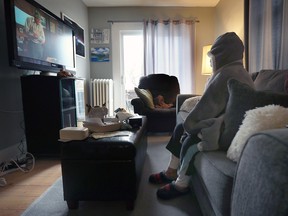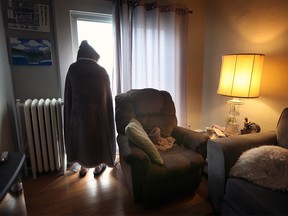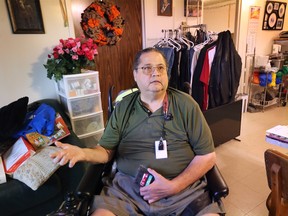[ad_1]

Article content
Editor’s Note: This is Part 3 of a three-part Windsor Star series examining the overburdened landlord-tenant system in Ontario. Part 1 outlined the overall situation, Part 2 explores a landlord’s perspective, while Part 3 looks at it from a tenant’s side.
It’s taken nearly five years.
Sherry Mailloux, a Windsor tenant, says she is still waiting — waiting for money she’s owed, for justice she was promised, and for a rental system that left her behind.
Advertisement 2
Article content
Rain speckled the windows of her new Windsor apartment on a damp, grey afternoon last November. Inside, wrapped in a blanket and framed by a view of the Detroit river, the 70-year-old reclined in fatigue. Mailloux is a cancer survivor twice over, a mother, and a tenant. The last of those roles, she now says, has drained her.
“It has taken all my time and energy,” Mailloux said of the drawn-out dispute over a unit she no longer lives in. She left because the ever-growing list of neglected repairs became overwhelming.
“I’m tired — my body is tired.”
Mailloux had taken her former landlord to Ontario’s Landlord and Tenant Board (LTB), the provincial tribunal for resolving rental housing disputes, over a furnace she was forced to replace out of pocket during the chilling winter of 2020 — a repair that was her landlord’s legal obligation.
The cost set her back almost $1,500, borrowed from her niece, who’s still waiting to be repaid.
It has taken five years for the tribunal to rule in her favour as of this January, but she still hasn’t seen a dime. The order is futile unless enforced through a small claims court, a separate process that adds to her years-long wait for justice.
Advertisement 3
Article content
While trying to recoup the cost of the furnace, Mailloux also fought multiple no-fault eviction attempts from her landlord who claimed he had plans to move into the unit. The notice threatened to displace her and her son.
“I didn’t know if we were going to be out on the streets,” Mailloux recalled the day she received the first notice, known as an N12, informing her she had 60 days to pack her belongings and move out.
If not for the support of Legal Assistance of Windsor, Mailloux said she would have left.
“Who was going to help us?” she said.
“How were we going to find a place? It weighed very heavily on my mind.
“Rent (in Windsor) was also starting to go up sky-high, and we wouldn’t have been able to afford anything.”

Her case is far from the exception.
Across the province, tenants like Mailloux are entangled in similar ordeals: drawn-out battles over basic repairs, hefty rent hikes, pest infestations, mold, or eviction notices delivered under the guise of renovations or takeovers.
Advertisement 4
Article content
These are symptoms of Ontario’s housing crisis, and a tribunal buckling under historic backlogs so long it can sometimes take more than a year just to secure a hearing.
“This is not just a Toronto problem,” said Rosalea Thompson, a staff lawyer with the Advocacy Centre for Tenants Ontario. “It’s a Windsor problem, too.”
No-fault evictions are becoming a popular loophole for landlords across the province.
Landlords can issue an N12 notice if they, or a family member or buyer, plan to move into the unit.
More often, tenants are served an N13 — known informally as a ‘renoviction’ — used for the purpose of clearing units for major renovations or demolitions.
According to data compiled by ACORN Canada, a national tenant advocacy group, Windsor now ranks fourth in Ontario for renovictions — trailing only Toronto, Ottawa, and Hamilton.
Between 2017 and August 2023, the use of N13 notices spiked 271 per cent. In Windsor, 14 were served in 2017, compared to 52 in 2022. The figures only account for reported cases.
Advertisement 5
Article content
The use of N12 notices also climbed by 21 per cent, with 89 served in 2017 compared to 108 in 2022, placing Windsor seventh in the province.
The eviction increase mirrors trends in other major cities across Ontario, where deep-pocketed investors have found a financial upside in clearing out long-term tenants.
One of the province’s most infamous landlords, Michael Klein, has been linked to 21 buildings across seven cities, according to ACORN. His alleged model: buying low-rent buildings, evicting existing tenants under no-fault claims, then re-renting at significantly higher prices. This tactic hacks away at the province’s already dwindling supply of affordable housing.
“There are huge financial incentives for landlords to evict their tenants by any means,” said Thompson. “We don’t have vacancy control (in Ontario), so when a landlord turns over a unit to a new tenant, they can increase the rent by whatever they want, whatever the market can bear, whatever tenants will pay.”
Advertisement 6
Article content
In some cases, she said, these notices are even accompanied by verbal threats and harassment.
“I have talked to many, many tenants who say, ‘I agreed to leave, and then my landlord re-rented the unit to someone else for double the rent’,” she said.
Clinics like Legal Assistance of Windsor are often tenants’ last line of defense, especially for the most vulnerable. Seniors, low-income tenants, and newcomers are disproportionally the targets of no-fault evictions.
The onus also falls on the tenant to prove their landlord has no plans to renovate or move into the unit. Without the resources and understanding of the Residential Tenancies Act — the main law governing the rights and responsibilities of landlords and tenants — these groups are least equipped to fight back.
“They’re coming to me in a crisis,” said Tori-Lee Jenkins, a lawyer from Legal Assistance of Windsor who represents Mailloux. “They’re experiencing a lot of anxiety. They don’t know where they’re going to live.
Advertisement 7
Article content
“It’s very difficult emotionally to see people struggling and who really need help, and I don’t even have a resource to give them.”
Even when tenants do fight back, they’re entering a tribunal system that has shifted online, away from in-person and paper forms. Windsor’s LTB counter has also shuttered.
“There’s a power imbalance and tenants don’t know how to access the system,” said Jenkins. “And once they get to that system, can it adequately address the things that they need it to address?
“Oftentimes, that answer is no.”

For Rob Vinson, 54, a tenant living in a subsidized downtown Windsor housing complex, a years-long cockroach problem has become a source of emotional distress.
In that time, he’s suffered two strokes and a kidney transplant. He now relies on a power wheelchair and the help of a personal support worker.
On a fall afternoon last year, Vinson wheeled through his dim, linoleum-tiled apartment, pointing out the cockroach traps tucked beneath his kitchen cupboards.
Advertisement 8
Article content
“People like to say that you live in a low-income building, so it shouldn’t matter,” said Vinson. “You should still have the dignity and the respect that any other person would have.
“And then they tell you to just move. We can’t just get up and move somewhere else. We have to be in a low-income building because we don’t have the income to be in a nicer place.”
Vinson said the pest issues had worn him down to the point of seeking out a therapist for depression. He also contacted the LTB, but says he never heard back.
Peter Coupe, director of Windsor Residence, confirmed cockroaches were found in some units. Once a tenant reports the issue, he said, the building provides tenants with cockroach traps and brings in a pest control company biweekly.
If the problem persists, notices are sent to surrounding units in case more pest treatment is required, he added.
Still, Vinson feels the building’s management did not act aggressively enough to stamp out what he calls a longtime problem.
Advertisement 9
Article content
Vinson hired a weekly cleaner with his own money to maintain a more livable environment.
Desperate for change, he put his name on Windsor’s affordable housing waitlist, despite the long odds of landing a new unit.
“For some tenants who may have the means to choose another apartment or choose another home, they may have left,” MPP and justice critic Kristyn Wong-Tam (NDP — Toronto Centre) told the Star.
“But the majority of the tenants who are now stuck in the queue in the middle of a housing crisis with the high cost of rent… those tenants are probably staying in those moldy, damaged, flooded, broken down apartments because they have no other place to go.
“So, the people with means are making their choices and cutting their losses. Those who are without means are usually the most vulnerable, the most poor. They’re not going anywhere and they’re still paying their rent.”
Even securing a hearing at the LTB has become a struggle, said Wong-Tam, with historic backlogs that began during the pandemic only growing worse.
Advertisement 10
Article content
“Everybody is stuck in this vicious queue,” said Wong-Tam.
“Nobody is getting administrative justice quickly in Ontario.”
Some tenants, however, find their issue resolved before even hearing back from the LTB.
While speaking to the Star recently, Vinson said about a month had passed since he’d last seen a cockroach in his unit.
“I feel so much better,” he said. “I was ready to move out. I had called the housing department at the city and filled out applications and stuff to move. Of course, the wait list is so long now. If I get it, I get it. If I don’t, I don’t.
“And I’m okay with that, because it’s so much better now.”
For Vinson, it was a small, but meaningful victory. He said he feels hopeful for the first time in years.

Still, not every tenant is so lucky.
When reached by the Star in March, Mailloux said she was still waiting for the money owed to her.
“I have to pay my niece, who I borrowed the money from,” she said.
“I know she needs it, and she’s been waiting patiently. So it impacts me, because I really don’t have the extra money either.”
Advertisement 11
Article content
Recommended from Editorial
-

‘Denying justice’ — Critics say Landlord and Tenant Board overwhelmed, inefficient
-

‘Disaster happened’ — Landlord says she’s close to losing house as Windsor tenants owe $20,000
And while she hoped her new apartment would bring relief from years plagued with stress, more problems have surfaced.
This winter, the heat and hot water in her new building shut off without warning, leaving tenants without basic services for weeks, said Mailloux. She later learned her new landlord stopped paying the property management company, the middle agency responsible for covering the bill.
Almost a month passed before the city intervened and restored services to tenants, she added.
Now, Mailloux is unsure if she will have to start over once again — the treadmill many low-income tenants must navigate.
The search for affordable housing seems near impossible. Rent is higher than ever, her health is fragile, and she is tired. And there is no guarantee another place would be any better.
“We can’t even afford to live here,” she said. “But we’re blessed, and we’re living day-by-day. I’m not going to complain. I don’t care if we have nothing left. We eat, and that’s the most important thing.
“I don’t want to keep on moving.”
mmazak@postmedia.com
Article content
[ad_2]
Source link



